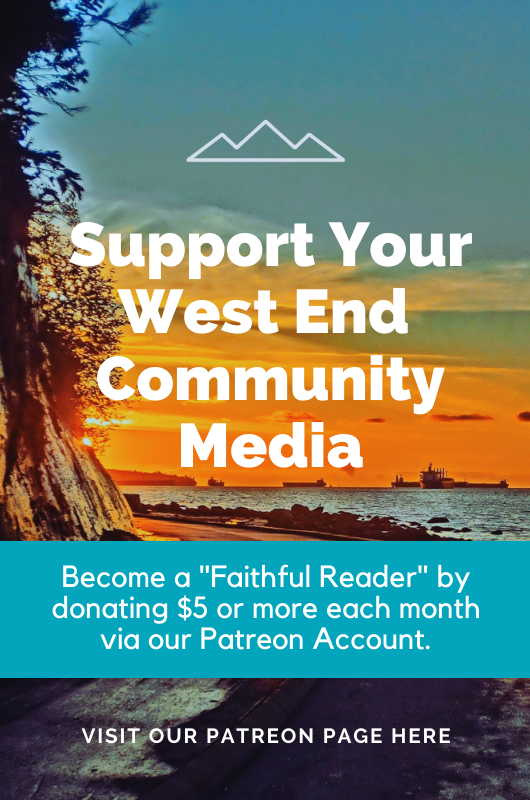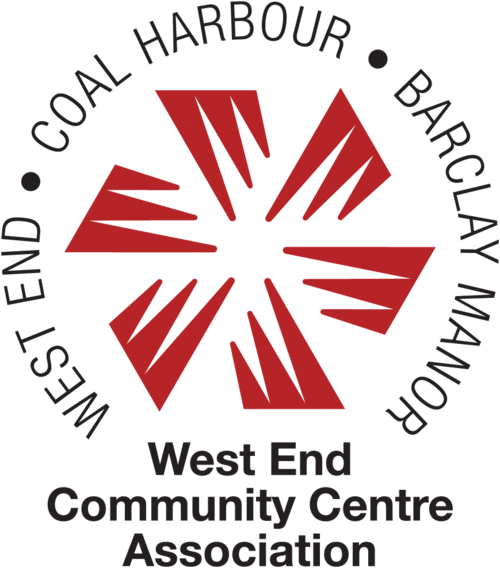A CLOSER LOOK
/by John Streit
Another decommissioned bus stop.
VANISHING BUS STOPS
And A New West End Route Proposal
(click images to enlarge)
If you take a walk, roll or bike ride east on or along Beach Avenue starting at the English Bay Cactus Club, you will start to notice them: abandoned bus stops. The modern glass and steel shelters are still in place, but the remaining poles have been stripped of their distinctive “T” metal signs along with route numbers. You will find a similar situation on nearby Denman Street with two ever-busy and decades-old West End bus stops discontinued.
COVID-19 has forced public transit operators around the world to make drastic changes to survive. Riders and revenue are down as people stay home to stay safe during the pandemic. TransLink has been hit hard, needing to slash costs by $135 million this year and next, according to outgoing CEO Kevin Desmond.
Anthony Kupferschmidt is executive director of the West End Seniors’ Network (WESN) and knows the neighbourhood and its citizens well, having lived here from 2005 to 2017. He now lives in Mount Pleasant, but spends most of his time in the West End. “When I moved to Vancouver, I picked the West End as my neighbourhood of choice because of the proximity to the SFU Vancouver campus. I was completing my MA in Gerontology at the time. It was one of the best decisions I have ever made.”
There has been no bus service eastboiund on Beach Avenue since last March.
Kupferschmidt says the WESN has several concerns about transit in the neighbourhood, starting with the continued closure of Beach Avenue to the eastbound No.23 bus route. “The loss of this bus route has had an impact on older adults who are unable to climb the hill to Davie Street where this bus has been redirected.”
Beach Avenue eastbound continues to be used as a temporary bikeway and has seen hundreds of thousands of cyclists since March. Signs indicate the street closure will continue through December with no indication from the City of Vancouver if it will stay closed or reopen in 2021. The decision may be helped by the results of a recent public survey about the Beach Avenue Bikeway. Proponents of the bikeway want it to become permanent, but with the removal of street parking westbound on Beach Avenue, making it a two-way street again with new space for cyclists. That would also mean the restoration of eastbound No. 23 bus service.
Kupferschmidt would like to see all pre-existing bus stops restored. “Our members and clients are telling us that every change to the bus stops in the community has an unanticipated impact on older adults and others with mobility limitations. Recent changes have taken place without consultation with the community.”
Nathan Davidowicz is a long-time transit advocate and has lived in Metro Vancouver since 1971. He agrees with Kupferschmidt that rerouting the No. 23 has created hardship for many bus riders. “The West End is the densest area in Canada. Transit has not been improved for many years. Every day there are up to 100 trips that are cancelled because drivers are not allowed to work overtime. So, bus service is not as reliable as prior to COVID.”
Balbir Mann, president of Unifor Local 111, which represents bus drivers, says changes may be coming soon to the Beach Avenue Bikeway.
“The City of Vancouver is looking to modify the pedestrian path and we have been provided with some design concepts. The intent is to partially reopen Beach Ave to two-way traffic and reduce transit impact. The City is still intent to allocate some existing roadway space on Beach to bikes and pedestrians. We will be able to modify the current route No. 23 detour closer to the original routing. However, it will not be fully back to the regular routing. Since the design is not completely finalized, we don’t have a definitive date for the change yet. It will be sometime this winter, hopefully in the next month or two.”
Dan Mountain with TransLink says the transit body has prioritized maintaining bus service during the pandemic, despite lower ridership, to provide more space for customers to physically distance. “Bus service in the West End has been at or near regular bus service levels throughout the pandemic. TransLink will continue to work with the City of Vancouver regarding bus service on Beach Avenue.”
These signs have appeared at numerous West End bus stops in recent months.
Kupferschmidt says WESN members are also concerned about the loss of the No. 5 (Robson/Downtown) and No. 6 route (Davie/Downtown) bus stops on Denman near Pendrell and at Nelson. Changes were made due to temporary patios allowed by the city to help restaurants during the pandemic. “We want to see businesses survive this pandemic and offer temporary patios, but not at the expense of bus stops.”
Davidowicz agrees, saying these routes carry millions of passengers per year actually making a small profit for TransLink. He claims both were cut 30 percent in September.
So how about an entirely new bus option in the West End? Davidowicz says as far back as 1971, a Greater Vancouver Regional District (now Metro Vancouver) report proposed bus service on Nelson Street. He feels the best routing is from Stanley Park Loop via Georgia, Denman, Nelson, Seymour, Dunsmuir, Granville, Smithe, Haro, Thurlow, Nelson, Denman, Georgia to Stanley Park. “The buses would be the small eight-metre community shuttles running every 15 minutes. This new bus route will be an immediate success and would help the No. 5 and 6 bus routes that are full most of the time.”
He is hoping an online petition could sway TransLink into considering the new route. Davidowicz has had past success using petitions. “I have been involved in petitioning for the No. 49 (Metrotown/Dunbar Loop/UBC) which started in 1975 and the No. 25 (Brentwood Station/UBC) which started in 1983. For each of these routes we collected 30,000 names.”
The response to the new bus stop “aprons” varies, depending on whether you’re a bus rider or a car driver.
The West End Journal asked Dan Mountain with TransLink about any possible transit expansion plans in the West End. “Transit service changes occur quarterly based on ridership data and seasonal demand. The next service change comes into effect in January.”
On Robson Street, three new “bus bulbs” between Burrard and Bute built during the pandemic are proving to be quite popular with transit users. The sidewalk has been extended to allow you to board right in the travel lane. That speeds up service because the bus doesn’t need to pull over, then merge back into sometimes unyielding traffic. Of course, if you’re in a vehicle you’ll have to patiently wait behind the bus. This has again led to discussions on social media about making Robson Street pedestrian-only. DeeDee Nelson says on Twitter “Yes! Then Robson needs to pick an identity: international nature resort classic chic, black, green, brown, stone, glass, attractive flower planters, water fountains, benches, trees down the middle, restaurant umbrellas, more ground-level restaurants, bakeries & cafes! Scooter rentals.”
But Kirpy Sangara on Twitter feels going pedestrian-only would be a mistake. “What’s it going to be like when it’s two degrees and raining in December/January/February? It will be terrible and completely deserted.”
Kupferschmidt believes the West End is well served by transit overall compared to some other neighbourhoods in Vancouver. “However, West Enders have not been as well served by transit during this pandemic. Between the loss of the eastbound Beach Avenue bus route and the loss of bus stops along the No. 5 and 6 routes, our community has been feeling the impact of COVID-19 on multiple fronts, including on transit.”









